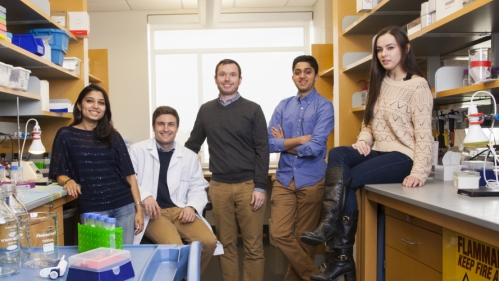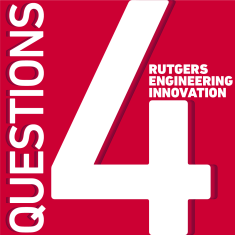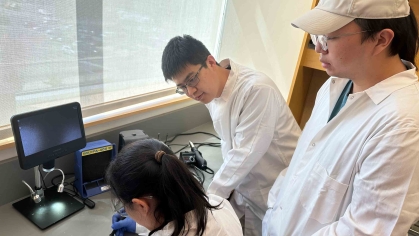Prof. Adam Gormley Advances Cutting-edge Research in Nanobiomaterials

Research in the Gormley Lab ranges from fundamental studies in self-assembly of nanomaterials to translational nanomedicine
Adam Gormley, an expert in nanobiomaterials, is an assistant professor of biomedical engineering at Rutgers University where he leads the Gormley Lab that seeks to develop bioactive nanobiomaterials for therapeutic and regenerative medicine applications. Using advanced synthetic and characterization techniques, Gormley is developing ligands (molecules that produce a signal by binding to a site on a target protein) to directly interface with the cell’s machinery of proteins in order to direct cell behavior. Other projects under investigation in his lab include nanomaterial self-assembly and nanoparticle-based diagnostics.
Gormley recently received a $2 million award from the National Institutes of Health to study synthetic ligand multivalency. Professor Gormley plans to use robotics plus machine learning to precisely program nano-bio interfaces using multivalent polymers.
Since joining Rutgers in 2017, Gormley has both furthered his research and supported student innovators, including a biomedical engineering senior design project team focused on creating a diagnostic tool that has the potential to mitigate the rise of antibiotic resistant bacteria by conceptualizing a point-of-care paper-based microfluidic device that can differentiate between bacterial and viral infections. The students’ project earned second place overall in the Massachusetts General Hospital's Ambulatory Practice of the Future’s annual student technology prize in primary healthcare competition.
Four Questions for Prof. Adam Gormley

What drew you to biomedical engineering and nanobiomaterials?
Throughout high school and college, I loved learning how things worked and taking them apart. As I became more proficient, I then learned to design new things. There was no doubt from these experiences that I wanted to be an engineer. But my parents were both physicians and I also loved chemistry and biology. To me, biomedical engineering and more specifically nanobiomaterials was the obvious place for me.
Who would most benefit from your research?
We are currently developing a variety of technologies that may benefit society. For example, we are developing robotics controlled by artificial intelligence to stabilize protein therapeutics. This has many applications throughout medicine.
What excites and inspires you about your research?
The students in my lab are young, ambitious, and energized. This culture fuels my inspiration and motivates me every day.
How are Rutgers Engineering students contributing to your research?
They do everything! From generating ideas, to obtaining amazing results, to publishing our findings. In many ways, I just point them in the right directions since I have the benefit of experience. Rutgers Engineering students are the intellectual drivers of our technologies.


